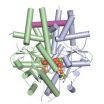Immune abnormalities in patients with psychosis have been recognized for over a century, but it has been only relatively recently that scientists have identified specific immune mechanisms that seem to directly produce symptoms of psychosis, including hallucinations and delusions.
This 'immune hypothesis' is supported by new work published by Pathmanandavel and colleagues in the current issue of Biological Psychiatry. They detected antibodies to the dopamine D2 receptor or the N-methyl-D-aspartate (NMDA) glutamate receptor in a subgroup of children experiencing their first episode of psychosis, but no such antibodies in healthy children. Both are key neural signaling proteins that have previously been implicated in psychosis.
"The antibodies we have detected in children having a first episode of acute psychosis suggest there is a distinct subgroup for whom autoimmunity plays a role in their illness," said Dr. Fabienne Brilot, senior author on the article and Head of the Neuroimmunology Group at The Children's Hospital at Westmead in Sydney.
It almost seems like a dirty trick. For decades psychiatrists have administered drugs that stimulate dopamine D2 receptors or block NMDA receptors. These drugs may briefly produce side effects that resemble symptoms of psychotic disorders, including changes in perception, delusions, and disorganization of thought processes. The current findings suggest that people may develop antibodies that affect the brain in ways that are similar to these psychosis-producing drugs.
"This study adds fuel to the growing discussions about the importance of antibodies targeting neural proteins and it raises many important questions for the field. Do these antibodies simply function like drugs in the brain or do they 'attack' and damage nerve cells in some ways?" questioned Dr. John Krystal, Editor of Biological Psychiatry. "Also, are these antibodies producing symptoms in everyone or do they function as a probe of an underlying, perhaps genetic, vulnerability for psychosis?"
Importantly, work is advancing rapidly in this area. Less than a decade ago, anti-NMDA receptor encephalitis was first identified, a disease characterized by inflammation of the brain that causes acute psychiatric symptoms including psychosis. It is commonly misdiagnosed as schizophrenia or bipolar disorder, but is a form of treatable brain inflammation caused by antibodies that attack the brain's NMDA receptors.
"The data from this study suggests that better interventions are possible, providing hope that major disability can be prevented for the subset of children experiencing acute psychosis with antibodies," Brilot added. "These findings also contribute significantly to an emerging acceptance in the field of the involvement of autoimmune antibodies in neurological diseases. Combined, these investigations are providing a better understanding of the biology of psychiatric and neurological diseases, as well as pointing to novel treatment approaches for children with these debilitating illnesses."
INFORMATION:
The article is "Antibodies to Surface Dopamine-2 Receptor and N-Methyl-D-Aspartate Receptor in the First Episode of Acute Psychosis in Children" by Karrnan Pathmanandavel, Jean Starling, Vera Merheb, Sudarshini Ramanathan, Nese Sinmaz, Russell C. Dale, and Fabienne Brilot (doi: 10.1016/j.biopsych.2014.07.014). The article appears in Biological Psychiatry, Volume 77, Issue 6 (March 15, 2015), published by Elsevier.
Notes for editors
Full text of the article is available to credentialed journalists upon request; contact Rhiannon Bugno at +1 214 648 0880 or Biol.Psych@utsouthwestern.edu. Journalists wishing to interview the authors may contact Fabienne Brilot at +1 02 9845 1456 or Fabienne.brilot@sydney.edu.au.
The authors' affiliations, and disclosures of financial and conflicts of interests are available in the article.
John H. Krystal, M.D., is Chairman of the Department of Psychiatry at the Yale University School of Medicine, Chief of Psychiatry at Yale-New Haven Hospital, and a research psychiatrist at the VA Connecticut Healthcare System. His disclosures of financial and conflicts of interests are available here.
About Biological Psychiatry
Biological Psychiatry is the official journal of the Society of Biological Psychiatry, whose purpose is to promote excellence in scientific research and education in fields that investigate the nature, causes, mechanisms and treatments of disorders of thought, emotion, or behavior. In accord with this mission, this peer-reviewed, rapid-publication, international journal publishes both basic and clinical contributions from all disciplines and research areas relevant to the pathophysiology and treatment of major psychiatric disorders.
The journal publishes novel results of original research which represent an important new lead or significant impact on the field, particularly those addressing genetic and environmental risk factors, neural circuitry and neurochemistry, and important new therapeutic approaches. Reviews and commentaries that focus on topics of current research and interest are also encouraged.
Biological Psychiatry is one of the most selective and highly cited journals in the field of psychiatric neuroscience. It is ranked 5th out of 135 Psychiatry titles and 14th out of 251 Neurosciences titles in the Journal Citations Reports® published by Thomson Reuters. The 2013 Impact Factor score for Biological Psychiatry is 9.472.
About Elsevier
Elsevier is a world-leading provider of information solutions that enhance the performance of science, health, and technology professionals, empowering them to make better decisions, deliver better care, and sometimes make groundbreaking discoveries that advance the boundaries of knowledge and human progress. Elsevier provides web-based, digital solutions -- among them ScienceDirect, Scopus, Elsevier Research Intelligence and ClinicalKey -- and publishes nearly 2,200 journals, including The Lancet and Cell, and over 33,000 book titles, including a number of iconic reference works. Elsevier is part of RELX Group plc, a world-leading provider of information solutions for professional customers across industries.
